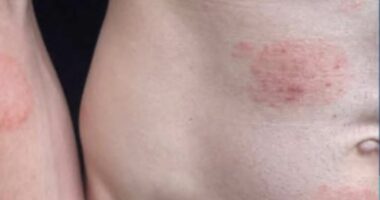Share this @internewscast.com
Once thought to be a danger largely reserved for travelers, a flesh-eating parasite known as Leishmania mexicana is now likely spreading locally through some sand flies native to the southern U.S., a new Centers for Disease Control and Prevention analysis has concluded.
Skin sores caused by Leishmania mexicana typically erupt weeks to months after people are bitten by an infected fly. The parasite can continue to inflict damage for years, leading to long-term scarring in its wake.
Hospitals have some options for drugs to use in trying to treat patients suffering from this disease caused by the parasite, which doctors call cutaneous leishmaniasis, though experts acknowledge there is “low certainty” about their effectiveness. Many patients who initially respond to treatment remain at risk of their leishmaniasis relapsing.
No vaccine is available for leishmaniasis.
The immediate concern triggered by the discovery is raising awareness of the parasite, officials say, which now appears to be “endemic” in Texas as well as some southern border states.
“This genetic information adds credence to this idea that leishmaniasis is occurring here in the United States, it’s endemic here in the United States, at least in Texas and maybe southern border states,” Dr. Mary Kamb, of the CDC’s Division of Parasitic Diseases and Malaria, said in an interview with CBS News.
Kamb co-authored the new findings, which were released Thursday in an abstract at the annual meeting of the American Society of Tropical Medicine and Hygiene.
A “very distinct” genetic fingerprint
When trying to diagnose patients, doctors typically collect samples by taking biopsies from their infected lesions.
Those are then often shipped off to the CDC, which until 2020 ran the only lab outside the military that could test for these parasites.
“For every case that we got, we reported this data. And after those years, you’re just pulling those results together to do this report, on cases collected during 2005 to 2019,” said Marcos de Almeida, who had helmed the CDC lab at the time.
The CDC’s review found a majority of leishmaniasis patients without travel history were infected by Leishmania Mexicana.
Among these cases, 50 were infected by a strain of the parasite which carried a slight but distinctive set of genetic changes that set them apart.
“Those two snips, those two polymorphisms in the sequence, are very distinct between those who reported travel history compared to those who did not,” said the CDC’s Vitaliano Cama, a microbiologist and veterinarian who also worked on the study.
At least one case with this genetic fingerprint had been reported each year, Cama said.
How leishmania parasites spread
Battling so-called “vector-borne” diseases like leishmaniasis often focuses on stamping out bugs that transmit the parasites between humans, as well as controlling the risk posed by other animals like rodents that can also serve as a “reservoir.”
Read Related Also: Post-pandemic plastic surgery boom: Record 26m cosmetic tweaks were carried out last year – these were the most in-demand procedures
Controlling sand flies can pose steep challenges compared to other larger insects. Sand flies are a fourth of the size of mosquitoes and do not need standing water to breed.
The World Health Organization estimates that leishmania parasites infect up to a million each year. Most cases in the Americas are diagnosed in Brazil, though infections from these parasites have also been reported throughout Latin America.
Muhammed Abdullah/Anadolu Agency via Getty Images
For U.S. doctors, leishmaniasis is not a reportable disease in most states, limiting the CDC’s ability to track whether cases are now accelerating.
However, Cama said the agency has been fielding a growing volume of requests to help with diagnosing leishmaniasis cases.
“It’s a trend, it’s not a huge jump, but there’s a trend of increasing requests,” said Cama.
Dogs could bring a more deadly parasite
The discovery also underscores the urgency of new recommendations now being drawn up to help officials address concerns that a deadlier cousin — Leishmania infantum — could also gain a U.S. foothold.
Leishmania infantum causes a more severe form of the disease called visceral leishmaniasis. More than 90% of visceral leishmaniasis patients who are not given timely treatment die, the Pan-American Health Organization says.
Symptoms include fever, weight loss and swelling of the liver and spleen.
In countries battling outbreaks of visceral leishmaniasis, dogs are considered “the main reservoir” of the parasite. Now a boom in recent years of dog arrivals from abroad, either through travel, adoptions or moving, has raised concerns of this parasite’s spread.
“All of us have been fielding these calls from state public health veterinarians, from Army veterinarians, that are trying to figure out what to do,” said Christine Petersen, director of the University of Iowa’s Center for Emerging Infectious Diseases.
Sporadic cases of leishmania infantum have already been reported spreading into dogs who have not traveled abroad. In addition to giving the parasite to flies, dogs can also spread the parasite directly through contact or bites.
Humans can also be unwitting carriers. Blood tests suggest as many as 1 in 5 American soldiers who were deployed to Iraq may have developed asymptomatic infections.
Working with scientists from the military and the CDC, Petersen co-authored a new “risk assessment tool” they hope will help veterinarians and public health officials figure out how to handle infected dogs if they catch the parasite. A draft of the tool was previewed at the ASTMH’s meeting.
Decisions on whether to euthanize the dog can be made guided by weighing factors like where the dog is from and the likelihood of local sand flies which might transmit the parasite.
“That’s what this whole risk assessment thing was about. Aside from rabies, maybe we should actually start talking about the other things that dogs carry that can kill us,” said Petersen.














